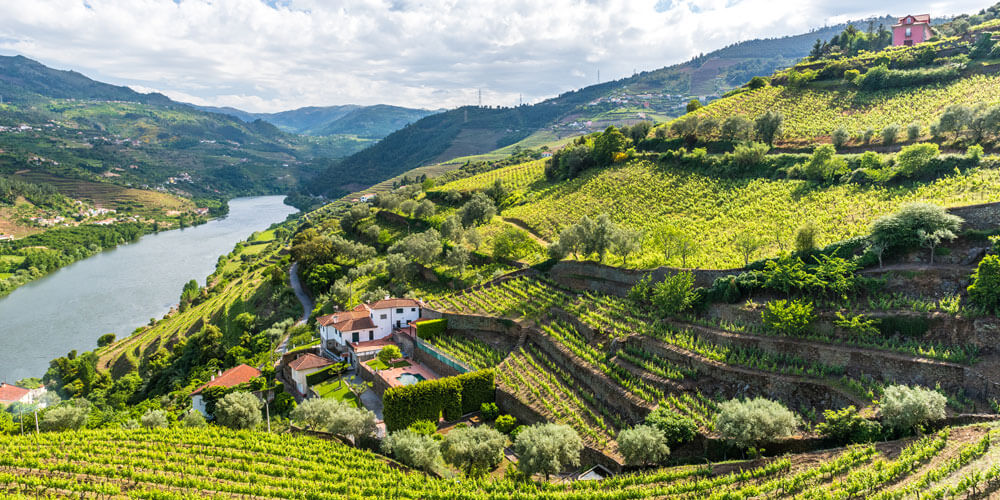
Wine & Soul Quinta da Manoella Vinhas Velhas 2021
- Red wine
- dry
- 2021
- Portugal - Douro
- Diverse Rebsorten
- Wine & Spirits April 2020: 94 points
- Wine Spectator February 2020: 97 points
- Robert Parker December 2019: 95 points
- Nattverden.com - Tom Marthinsen: 98 points
Ready to ship today,
Delivery time appr. 1-3 workdays

Quinta de Cabriz Reserva Tinto 2018
- Red wine
- dry
- 2018
- Portugal - Dão
- Alfrocheiro, Aragonez, Touriga Nacional
- Wine Magazine: 16.5 Punkte
- Wine Grandes Escolhas: 16.5 Punkte
Ready to ship today,
Delivery time appr. 1-3 workdays

Quinta da Alorna Marquesa de Alorna Grande...
- Red wine
- dry
- 2019
- Portugal - Lisboa
- Diverse Rebsorten
- Robert Parker: 93 Punkte
- Revista de Vinhos: 17 Punkte
Ready to ship today,
Delivery time appr. 1-3 workdays

Quinta da Alorna Reserva Tinto Touriga Nacional...
- Red wine
- dry
- 2020
- Portugal - Tejo
- Cabernet Sauvignon, Touriga Nacional
Ready to ship today,
Delivery time appr. 1-3 workdays
More Information
Portugal gilt als Geheimtipp unter Weinliebhabern. Hier wird seit der Antike Wein angebaut und als älteste Weinbauregion der Welt ist die „Alto Douro“ sogar UNESCO Weltkulturerbe. Das Anbaugebiet liegt östlich von Porto am gleichnamigen Fluss Douro. Hier speichern Schieferböden viel Feuchtigkeit und versorgen damit die Reben während der trockenen und heißen Sommer. Die Trauben werden zu Portwein und schweren, tanninreichen Rotweinen verarbeitet. Leichtere Weine, wie der Vinho Verde, kultivieren die portugiesischen Winzer im kühleren atlantischen Klima des Nordens.
Winzer sind wahre Meister des Blendings
Portugiesische Rotweine sind einzigartig. Heimische Rebsorten, die es sonst nirgendwo auf der Welt gibt, und die Art ihrer Verarbeitung als Cuvées, machen sie zu etwas ganz Besonderem. Schon immer wurden alle portugiesischen Weine aus einer Kombination von bis zu mehr als zwanzig Rebsorten verschnitten. In der Kunst des Blendings sind portugiesische Winzer wahre Meister. Unter ihren erfahrenen Händen entstehen einzigartige und unverwechselbare Cuvées, die neue, spannende Weinerlebnisse versprechen.
Heimische Rebsorten sind die wesentliche Grundlage für portugiesische Rotweine. Nur in kleinem Maßstab werden auch international bekannte Rebsorten wie Cabernet Sauvignon und Merlot angebaut. Sie sind aber fast immer nur das „Salz und Pfeffer“ um heimische Weine abzurunden.
Kraftvolle rebsortenreine Weine
Immer mehr an Bedeutung gewinnen in jüngster Zeit sogenannte Monocasta-Weine, also rebsortenreine Weine oder Cuvées, die aus höchstens zwei bis fünf verschiedenen Rebsorten verschnitten wurden. Reinsortig ausgebaute Weine zeigen meist ein intensives Bukett von roten Früchten wie Kirschen und Erdbeeren, auch Wildblumenaroma gehört zu ihren besonderen Merkmalen. Rebsortenreine Rotweine sind kraftvoll, dicht und mit feinen fruchtigen und würzigen Akzenten.
Farbintensive Weine mit komplexen Aromen
Eine typische Cuvée-Rebe ist die Touriga Nacional. Dieursprünglich aus dem Norden Portugals stammende Rebe begeistert durch ihre mit komplexen Aromen und Geschmacksnoten aus Veilchen, Lakritze, schwarzen Johannisbeeren und Himbeeren. Aus ihr entstehen dichte, farbintensive Weine mit einer leicht feinherben Note von Bergamotte.
Auch die am häufigsten im Duoro-Tal angebaute Sorte Touriga Franca wird gerne für die Herstellung von Cuvées verwendet. Sie steht für große Farbintensität, für feste, reichhaltige und aromatische Weine mit einer leicht blumigen Note und Brombeeraroma. Sie ist auch eine der fünf offiziell für Portwein empfohlenen Trauben.
Sandige, heiße Böden für fruchtige Weine
Die Rebsorte Castelão ist zwar in ganz Portugal verbreitet, fühlt sich aber am wohlsten in den heißen Klimazonen und auf trockenen sandigen Böden. Sie ist deshalb besonders im Süden Portugals eine gern angebaute Rebsorte, wie etwa auf der Halbinsel Setúbal südlich von Lissabon oder in der DOC Palmela, wo sie Periquita genannt wird. In ihrer Jugend steht die Castelão-Rebe für fruchtige, konzentrierte Weine mit Noten von Himbeeren und roten Johannisbeeren. Mit zunehmendem Alter entwickeln sich ein geschmeidigeres Aroma mit Anklängen von Zeder und Tabak.
Feine, elegante Rotweine
Für einen feinen, eleganten Rotwein steht die Rebe Aragonez, die im Norden Portugals unter dem Namen Tinta Roriz bekannt ist und im Weinanbaugebiet Alentejo Aragonez angebaut wird. Die Spitzenrebsorte mit den drei Namen, festen Tanninen und dem Aroma roter Früchte wird zu rebsortenreinen Douro-Weinen und Portweinen verarbeitet. Sie findet sich aber zusammen mit anderen Rebsorten wie der Trincadeira auch in Cuvées wieder.
Überall in Portugal, aber besonders in trockenen, warmen Gegenden und vor allem im Alentejo wächst die Trincadeira Rebe, die in der Douro-Region auch Tinta Amarela genannt wird. Eine sehr frische Säure zeichnet sie aus und darüber hinaus ein Himbeeraroma mit Gewürz-, Pfeffer- und Kräuternoten.
Großes Lagerungspotential
Schwere, sortenreine Rotweine aus der Baga -Traube entstehen vor allem im Zentrum Porugals. Bei der Stadt Agueda, im Região Centro, in ihrem Hauptanbaugebiet in der Region Bairrada findet die Baga Rebe als spät reife Sorte genau das richtige Klima für trockene, sehr reichhaltige Rotweine mit hohem Tanningehalt und großem Lagerungspotenzial. Ein intensives Brombeer-, Kirsch- und Pflaumenaroma und die markante Säure zeichnet die Sorte aus, die auch gerne für Schaumweine verwendet.
Terrassenförmige Weingärten
Zu finden sind die Trauben aber auch im traditionsreichen Weinanbaugebiet in der gebirgigen Beira-Region im Norden Portugals, das an die Serra da Estrela, das höchste Gebirge Portugals, angrenzt. Viele Weingärten sind terassenförmig angelegt und schon im 12. Jahrhundert soll der erste portugiesische König dort die Pflanzung von Weinreben angeordnet haben. Durch Gebirge im Westen ist das Dão von atlantischen Einflüssen abgeschirmt. Regenreiche Winter, heiße und trockene Sommer und der lange kühle Herbst sorgen für optimale Bedingungen für die Erzeugung eleganter Weine. Bekannt sind die Rotweine, deren Reben in den Hochlagen auf Granitboden wachsen, für ihren sehr kräftigen, trockenen Charakter, der durch längere Lagerung voll zur Geltung kommen.

